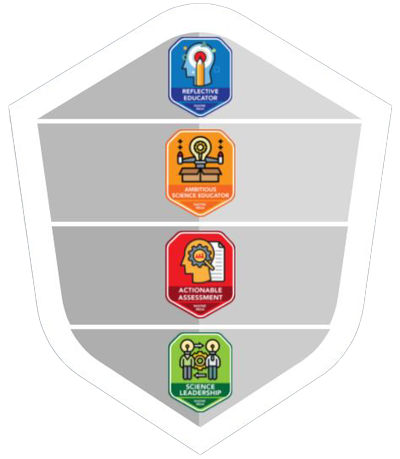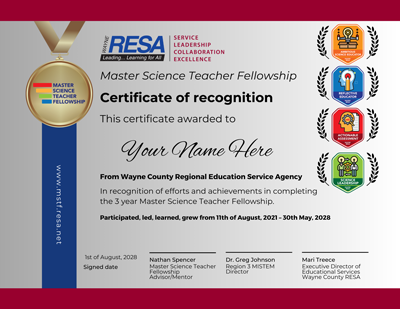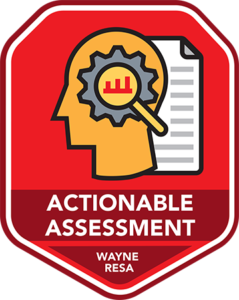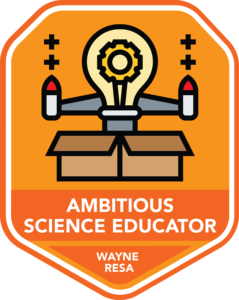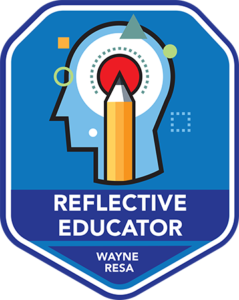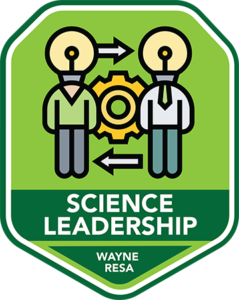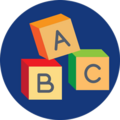MSTF Action Research Project
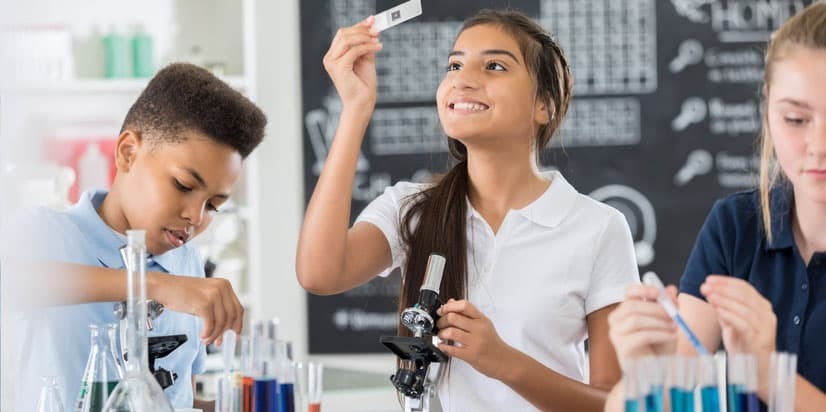
The goal of Master Science Teacher Fellowship (MSTF) is to provide professional learning experiences to facilitate science teachers growth in their professional knowledge and practice, to become effective mentors and coaches, and become instructional leaders within their schools, districts and the science education community.
About MSTF
The Master Science Teacher Fellowship is an opportunity to become part of a community of science educators who learn, lead, and grow together. We at Wayne County RESA know that teaching is a complex endeavor and we aim to create a county wide network of skilled educators and mentors that will move science education throughout the 21st century.
The MSTF is looking for candidates who want to grow in their content knowledge, seek to learn and implement evidence-based classroom practices, and become mentors and leaders in the field of science education.
MSTF Model
- Engaging with Community of Science Education Professionals
- Advancing Professional Knowledge and Skill
- Serving as Mentor and Leader in the Science Education Community
- Building Self-Efficacy as a Science Education Professional
Apply for Fellowship
Eligibility Requirements
- Current and certified secondary science teacher or elementary teacher within Wayne County
- 60% or more of classes must be in science courses if you are a secondary teacher. If elementary, science must be a core discipline in your weekly schedule
- Have between 3 and 15 years of teaching experience.
Application Process:
- Complete the online application form, which includes: Personal information, teaching experience, and professional learning experience questions.
- Complete a personal statement. You will receive the personal statement question upon review of your application. This statement will be in an essay format no longer than 600 words in duration.
- Two letters of recommendation (digital form sent directly to references listed on the application form)
- One of the following: Current Principal, Building Administrator, Curriculum Director
- Science Teaching Peer or Instructional Coach
- Complete commitment form: Candidates must commit to:
- Willingness and ability to agree to all terms and conditions required for participation for the entire duration of the 3 year program
- Current employed and certified secondary science teacher or 3-5 elementary teacher within Wayne County
- 60% or more of classes must be in science courses if you are a secondary teacher. If elementary, science must be a core discipline in your weekly schedule
- Between 3 and 15 years of teaching experience
- Commitment to teaching in a Wayne County School for the duration of the program
- Sharing their classroom teaching practices through video and audio recordings, interviews and reflection
- Uses a high-quality rated curriculum or has the capacity and ability to modify existing curriculum to meet expectations of the Michigan Science Standards (NGSS)
- Ability to obtain recommendations from direct supervisor and peer (teacher/coach)
- Committed to improving achievement among their students
- Attending 80% of Fellowship meetings during their 3 years in the program
- Sharing relevant student data within the program
- Hosting/co-hosting at least 1 Fellowship meeting within their 3 years
- Inviting other teachers and Fellows into the classroom for Classroom Learning Lab or Studio Days
- Working closely with Wayne County RESA Science Education Consultant who will serve as an advisor, mentor, and coach in the program
- Sharing the practices, progress, and story of their Fellowship experience with other educators
- Hosting and/or participating in a Classroom Learning Lab or Studio Days session once/year in the program
- Complete Critical Reflections in years 1 and 2 as well as an action research project in the final year of the program
MSTF FAQ
Requirements
- Current and certified secondary science teacher or elementary teacher within Wayne County
- 60% or more of classes must be in science courses if you are a secondary teacher. If elementary, science must be a core discipline in your weekly schedule
- Fellows must agree to the commitment of the MSTF
Commitments
All teachers accepted as Wayne County Master Science Teaching Fellows must commit to the following:
- Willingness and ability to agree to all terms and conditions required for participation for the entire duration of the 3 year program
- Current employed and certified secondary science teacher or 3-5 elementary teacher within Wayne County
- 60% or more of classes must be in science courses if you are a secondary teacher. If elementary, science must be a core discipline in your weekly schedule
- Between 3 and 15 years teaching experience
- Commitment to teaching in a Wayne County School for duration of program
- Sharing their classroom teaching practices through video and audio recordings, interviews and reflection
- Uses a high quality rated curriculum or has capacity and ability to modify existing curriculum to meet expectations of the Michigan Science Standards (NGSS)
- Ability to obtain recommendations from direct supervisor and peer (teacher/coach)
Committed to improving achievement among their students - Participating in all learning experiences including: attending 80% of Fellowship meetings during their 3 years in program, attending all workshops and field learning experiences, participating in book study, participating in coaching cycles, participating in Classroom Learning Labs and Studio Days
- Sharing relevant student data within the program
- Hosting/co hosting at least 1 Fellowship meeting within their 3 years
- Inviting other teachers and Fellows into classroom for Classroom Learning Lab or Studio Days
- Working closely with Wayne County RESA Science Education Consultant who will serve as an advisor, mentor, and coach in the program
- Sharing the practices, progress, and story of their Fellowship experience with other educators
- Hosting and/or participating in a Classroom Learning Lab or Studio Days session once/year in the program
- Complete Critical Reflections in years 1 and 2 as well as an action research project in final year of program
Benefits
Mentoring and Coaching – Science education is a challenging profession that requires consistent reflection and is greatly enhanced with feedback, which is why we make sure Fellows have access to an advisor and mentor throughout the Fellowship. Our mentors regularly checks in with Fellows, supports them to plan and reflect on instruction, talks them through challenging professional dilemmas, and supports them through personal challenges. Mentors also observe Fellows teach, either virtually or in person, and coach them into improvement that is Fellow directed.
Community Membership – MSTF Fellows are able to tap into a support network of their MSTF peers who are committed to improving education. Each year this network will widen in its numbers. From in-person conversations that take place at meetings to virtual conversations that take place on our online community, being part of the MSTF network means resources and support from a wide range of innovative and committed professional teachers is always available.
Certification – Fellows will earn micro-credentials and an MSTF Certification upon completion of the 3 year Fellowship. These micro-credentials and the Wayne County Master Science Teacher certification are backed by SCECH’s and are aligned with MDE guidelines for science instruction in the State of Michigan.
Financial Support – Upon completion of micro-credential reporting, Fellows may earn up to a $1,000 stipend per year. All courses in the Fellowship will be supported by our funders, and any substitute teacher costs associated with “Studio Days” will also be paid for.
MSTF Roadmap
Master Science Teacher Fellowship Roadmap
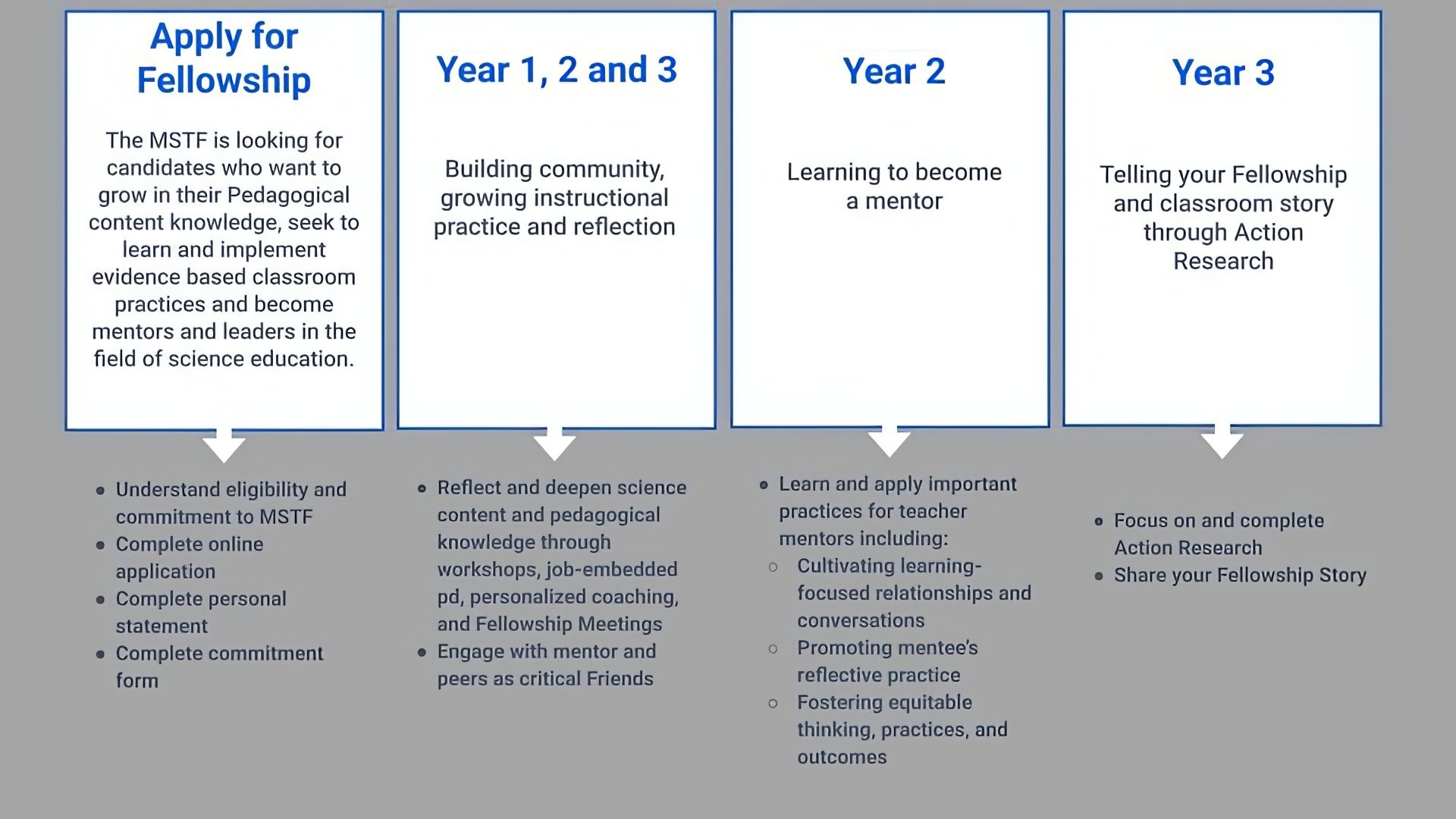
Apply for Fellowship
The MSTF is looking for candidates who want to grow in their Pedagogical content knowledge, seek to learn and implement evidence based practices and become mentors and leaders in the field of science education.
- Understand eligibility and commitment to MSTF
- Complete online application
- Complete personal statement
- Complete commitment form
Year 1, 2 and 3
Building community, growing instructional practice and reflection
- Reflect and deepen science content and pedagogical knowledge through workshops, job-embedded pd, personalized coaching, and Fellowship Meetings
- Engage with mentor and peers as critical Friends
Year 2
Learning to become a mentor
- Learn and apply important practices for teacher mentors including:
- Cultivating learning-focused relationships and conversations
- Promoting mentee's reflective practice
- Fostering equitable thinking, practices, and outcomes
Year 3
Telling your Fellowship and classroom story through Action Research
- Focus on and complete Action Research
- Share your Fellowship Story
Micro-credentials
Professional Learning
Job Embedded Professional Learning
Classroom Learning Labs
Classroom Learning Labs are a form of job-embedded professional learning that takes place during the school day.
GOAL
Opportunity for MSTF Fellows to experience in-depth, professional thinking and learning around the craft of teaching within a collaborative community.
Coaching/Planning Conversation Prior to Classroom Learning Lab
- The Classroom Learning Lab Facilitator arranges for a prep/planning/coaching conversation prior to the lab day.
- The Learning Lab Facilitator helps the host teacher focus the lesson that exemplifies target be practices and identified goal
Pre-Observation Conversation – Pre-brief
- Welcome – Facilitator
- Host Teacher shares their intentions for teaching the lesson, student learning and also the pre-observation work that students may have had.
- Network guests select individual focus intentions for the CLL Observation – share with group and host teacher.
- Host teacher leaves to prepare students for the day.
- Guests review observation and note-taking format using Classroom Learning Lab Observation form.
- Norms on Classroom Learning Lab form – Review and set an intention for yourself – share with a partner.
- Silence cell phones and move to the classroom.
Observation
- Try to stand off to the side or back of the room. Be prepared to shift quietly as needed.
- Share a rotation of 3 people moving about the classroom to capture student / teacher evidence.
- Keep track of evidence of student learning and the craft of teaching. Jot down questions you might have.
Post-Observation Conversation – Debrief
- Each participant writes down what they noticed and wondered about on the Guest Reflection form, Host teacher completes the Host Reflection form.
Studio Days
Developed at the University of Washington and the Ambitious Science Teaching Project, Studio Days are a form of job-embedded professional development that take place during a school day. School teams develop a vision of “what is possible” in instruction and to take principled risks with practices. Multiple role actors (classroom teachers, coaches, administrators, and researchers) collaborate to provide real-time feedback within current lessons. Although Studio Days feature a wide variety of science content, the goal of each science studio day is the same: to support students in improving explanations, models, and arguments of scientific phenomena. Before the studio the MSTF advisor and mentor will help facilitate a common planning meeting with teachers from a school; they design a unit of instruction and lessons to be used for the following studio day. On the day of the studio, teachers and others attending studio days engage in multiple rounds of co-planning, co-teaching, and co-debriefing.
Instructional Coaching/Impact Cycles
Fellows will work with their advisor/mentor through multiple cycles of learning, action, and reflection aimed at shifting and improving classroom instruction to more closely align with the MSTF Standards of Practice and students’ abilities to engage in 3-dimensional sensemaking of phenomena.
Portfolio
Classroom Action Research
Each Fellow will be given the book “Action Research Guidebook” – a process for pursuing equity and excellence in education” as a guide for the classroom action research portion of the portfolio project. Fellows are expected to use the Action Research Guidebook as they develop and enact their action research utilizing the Action Research Cycle as described in the text.
Action Research Guidebook
A process for pursuing equity and excellence in education
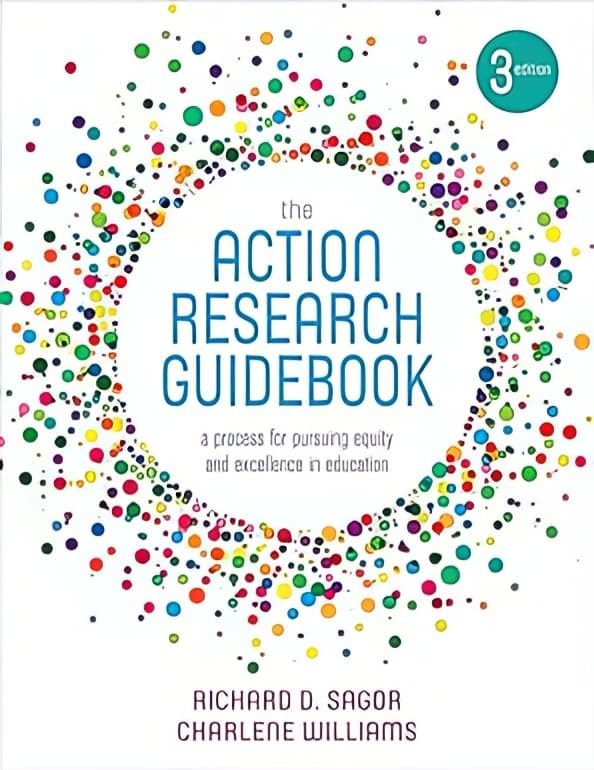
Action Research Evaluation
Fellows portfolio must show proficiency in each category of the rubric. The document below comes from Master Science Teacher Fellowship (MSTF).
* Fellows research projects that do not meet proficiency in each category will not count toward earning a Wayne County Master Science Teacher Certification.
** Fellows will have an opportunity to resubmit their portfolio within one year.
Writing Component
- The "Action Research Guidebook" contains all the required elements for the writing component. Chapter 10, pages 184-195 describes the necessary elements. Resource D – Sample Abbreviated Action Research Reports, pages 218 – 245 will be a helpful resource.
- The report must include the following characteristics:
- Explanation of context, problem, and issue
- Theoretical perspective
- Research Design
- Analysis of data
- Action Planning
Video Component
- Fellows must use video evidence for data collection and analysis.
- Fellows will decide which aspects of their ambitious science teaching practices will benefit from video analysis.
- Video analysis tools may be found in MSTF documentation.
- Fellows must utilize and submit 3 pieces of video evidence over the course of the action research cycle.
- Video submissions must follow guidelines in the "Capturing Student Video" section.
- Fellows will decide which aspects of their ambitious science teaching practices will benefit from video analysis.
Analyzing Student Work
And Implementation of Ambitious Teaching Practices
- The work chosen will be determined by the Fellow as they develop their action research plan.
- The Fellow will determine appropriate tools to analyze student work or other student data. Reflection tools may be found in the Action Research Guidebook and MSTF documentation.
- All student work must be included in the portfolio submission, following anonymity guidelines in the document and "Action Research Guidebook".
Fellowship meetings
Fellowship meetings are held monthly. Meetings will be held both virtually and face to face. Fellows come together to learn, share and grow.
- Fellows leading Fellows: At the core of the Fellowship meetings are teaching Fellows to share their work and experience with their peers in the Fellowship.
- Learning both in content and Practice: Fellowship meetings will provide an opportunity to grow in content knowledge and awareness, and explore connections across science disciplines and considerations for classroom implementation.
- Learning from others: Opportunities to engage with and learn from others in the fields of science and education.
- Summer workshops: 4 day workshop experiences
2025 - 2028 Inaugural Cohort Timeline
- Online applications due May 4th 2025 at 11:59pm
- Personal statement and letters of recommendation due June 8th 2025 at 11:59pm
- Fellow selections made and new cohort members notified June 13th 2025
- Fellowship begins August 11th 2025 (date of 4-day workshop)
Submit a Referral
Do you know someone who is starting their career as a science teacher? If so, the Master Science Teacher Fellowship could be the opportunity of a lifetime. Please fill out the below form to refer a potential Fellowship applicant. Once you submit this form, an email about the Master Science Teacher Fellowship will be sent to the prospective Fellow.
Contact Information
For questions regarding the MSTF, please contact


